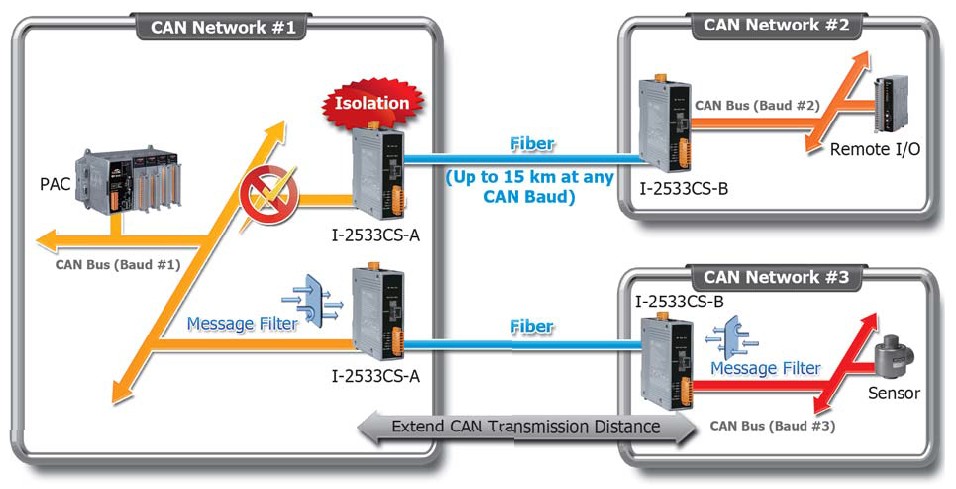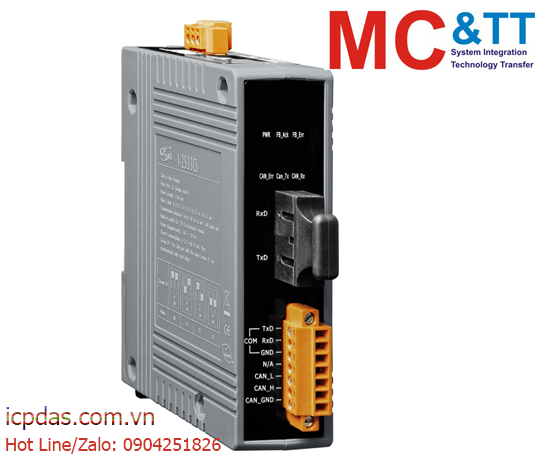Bộ chuyển đổi CAN sang quang 1 cổng Single-mode (15km) SC ICP DAS I-2533CS-A CR
The I-2533CS-A and I-2533CS-B are local CAN bridges used to establish a connection between two CAN bus system via single mode fiber optic transmission medium. In order to solve the problem between CAN and fiber transmission medium, the I-2533CS-A/B are specially designed for converting the electrical CAN bus signal to fiber optic cables. The I-2533CS-A/B supports Wavelength Division Multiplexing (WDM) technology so that only a single fiber cable is needed for transmitting bi-directional CAN data. As the I-2533CS-A and I-2533CS-B must be paired because of hardware limitations, this means that the cost of deploying fiber cable can be effectively reduced. I-2533CS-A/B have three more important features. First, the transmission distance limitation of the CAN bus system will not affected due to the different CAN baud rate. It means that the total CAN bus working distance can be extended. Second, the bus error on one CAN network will not affect the operation of another CAN network. Finally, the two CAN network can communication with each other by using different CAN baud rate for highly
Important Note: You must purchase both I-2533CS-A and I-2533CS-B since these products work as a pair
| Model Name |
I-2533CS |
I-2533CS-60 |
I-2533CS-A / I-2533CS-B*Note1 |
| CAN Interface |
| Connector |
Screwed terminal block (CAN_GND, CAN_L, CAN_H) |
| Baud Rate (bps) |
10 k ~ 1 M |
| Transmission Distance (m) |
Depend on baud rate |
| Terminal Resistor |
Switch for 120Ω terminal resistor |
| Isolation |
2500 Vrms on the CAN side |
| Specification |
ISO 11898-2, CAN 2.0A and CAN 2.0B |
| Propagation Delay |
190 us *Note2 |
| Fiber Interface |
| Type |
SC Duplex type ; Single mode ; 100 Base-FX |
SC type ; Single mode ; 100 Base-FX |
| Wave Length (nm) |
1310 |
TX: 1310, RX: 1550 for I-2533CS-A
TX: 1550, RX: 1310 for I-2533CS-B |
| Fiber Cable (μm) |
8.3/125, 8.7/125, 9/125 or 10/125 |
| Transmission Distance (km) |
30 (indicative only) |
60 (indicative only) |
15 (indicative only), (9/125 μm recommended) |
| Min. TX Output (dBm) |
-15 |
-5 |
-14 |
| Max. TX Output (dBm) |
-8 |
0 |
-8 |
| Max. RX Sensitivity (dBm) |
-34 |
-35 |
-31 |
| Max. RX Overload (dBm) |
-5 |
0 |
| Budget (dBm) |
19 |
30 |
17 |
| UART Interface |
| COM1 |
RS-232 (configuration only) |
| COM1 Connector |
Screwed terminal block (RXD, TXD, GND) |
| LED |
| Round LED |
PWR, FB_Ack, FB_Err, CAN_Err, CAN_Tx and CAN_Rx LEDs |
| Power |
| Power supply |
Unregulated +10 ~ +30 VDC |
| Protection |
Power reverse polarity protection, Over-voltage brown-out protection |
| Power Consumption |
0.125 @ 24VDC |
| Mechanism |
| Installation |
DIN-Rail |
| Dimensions |
33.0 mm x 126 mm x 101 mm (W x L x H) |
| Environment |
| Operating Temp. |
-25 ~ 75 ℃ |
| Storage Temp. |
-30 ~ 80 ℃ |
| Humidity |
10 ~ 90% RH, non-condensing |
Note1:
The I-2533CS-A and I-2533CS-B is a couple. Users must use pair in the applications. Due to this characteristic, the Group ID of the I-2533CS-A and I-2533CS-B is not used..
Note2:
The propagation delay depends on the CAN Bus baud rate and the CAN message format. This value has been tested using a CAN baud rate of 1 Mbps, the CAN ID 0x12345678 and 8 bytes of data with a value of 0xFF.






